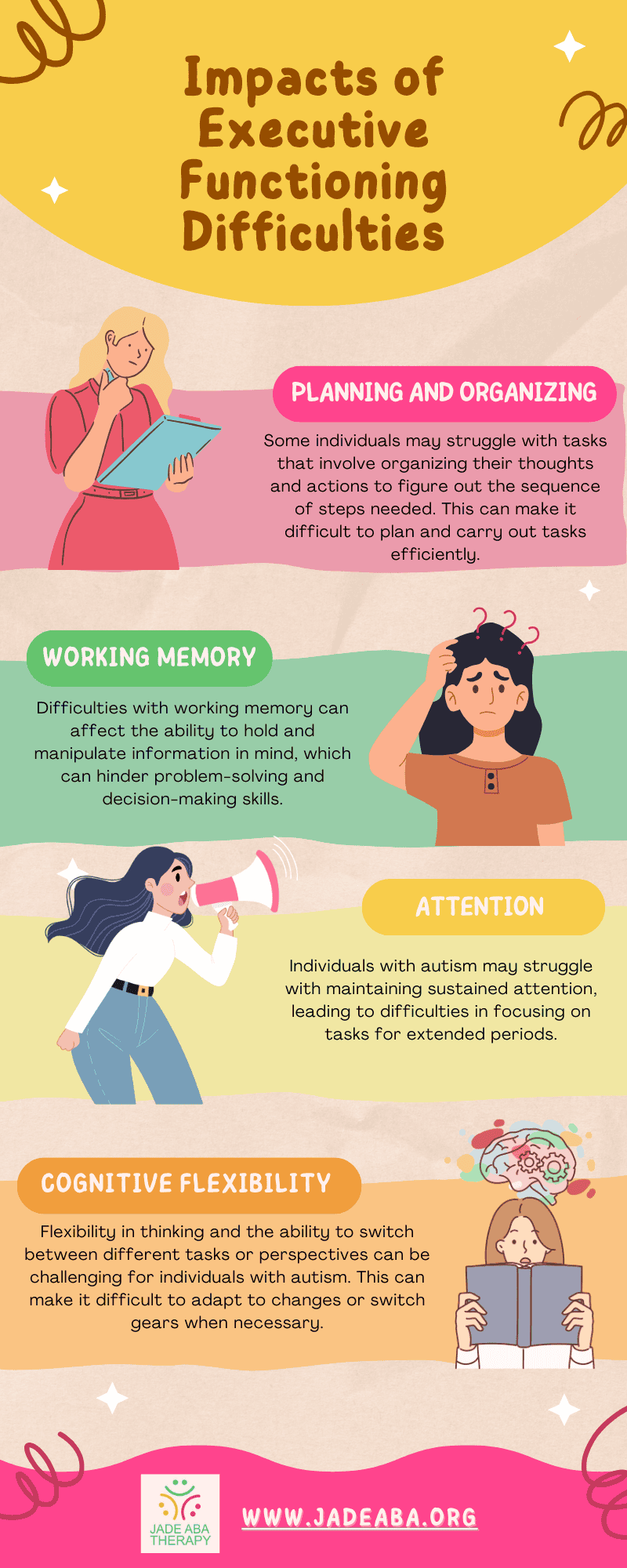Executive functioning refers to the cognitive processes that help regulate, control, and manage thoughts and actions. It encompasses a range of skills that work together to assist individuals in setting goals, planning, organizing, problem-solving, and self-monitoring.
These skills include, but are not limited to, planning, working memory, attention, problem-solving, verbal reasoning, inhibition, cognitive flexibility, initiation of actions, and monitoring of actions.
Let’s explore this topic in further detail.

The Importance of Executive Functioning
Executive functioning is crucial in various aspects of life ranging from academic and occupational success to social interactions and independent living. These skills enable individuals to manage their time effectively, prioritize tasks, follow instructions, stay focused, and adapt to changing situations.
Strong executive functioning skills contribute to better decision-making, problem-solving abilities, and overall self-regulation.
For individuals with autism, however, executive functioning difficulties can be particularly challenging. According to research, autistic individuals often have difficulty with executive function tasks due to the reduced activation of the frontal cortex of the brain which controls executive function skills.
Social and communication differences associated with autism can also contribute to these challenges.
Autistic individuals, particularly children, are more likely to require assistance with executive functioning tasks, such as concentration, memory, planning, organizing, self-control, and problem-solving.

Challenges Faced by Individuals with Autism
Individuals with autism often face challenges in various aspects of executive functioning. These challenges can end up impacting their daily functioning and academic performance.
Impacts of Executive Functioning Difficulties
Executive functioning difficulties can be associated with poor impulse control, trouble maintaining attention, and difficulty with complex thinking that requires holding more than one train of thought at the same time.
These challenges can manifest in several ways, leading to various impacts on individuals with autism, such as:

Specific Areas of Struggle
Executive function deficits can vary among individuals with autism, and they may have issues with specific aspects of executive functioning. Some common areas they struggle with include:
- Planning – Difficulties with planning can make it challenging to break down larger tasks into manageable steps or to anticipate the necessary actions to achieve a goal.
- Problem Solving – Individuals with autism may face challenges in problem-solving, finding it difficult to identify effective strategies or think flexibly to overcome obstacles.
- Working Memory – Difficulties with working memory can impact the ability to hold and manipulate information in their mind, leading to difficulties in following multi-step instructions or remembering information.
- Attention – Maintaining attention for extended periods can be challenging for individuals with autism, making it harder to concentrate on tasks or ignore distractions.
- Reasoning – Complex reasoning tasks that require abstract thinking or logical deduction may pose difficulties for individuals with autism.
- Initiation – Some individuals may struggle with initiating tasks, finding it challenging to start or transition between different activities.
- Inhibition – Difficulties with inhibitory control can result in impulsivity, making it harder to resist immediate urges or impulses.
Understanding the specific areas of executive functioning that individuals with autism may struggle with is essential for providing the necessary support and interventions to help them thrive in various settings, including the classroom and daily life.

Support and Interventions
Individuals with autism may benefit from various types of support and interventions to enhance their executive functioning skills. These interventions can range from professional assistance to practical techniques implemented in daily life.
Professional Support for Executive Functioning
Seeking professional support is a valuable option for individuals with autism who experience challenges in executive functioning. Healthcare professionals, such as psychologists, occupational therapists, and special education teachers, can provide specialized guidance and strategies tailored to the individual’s needs.
These professionals can conduct comprehensive assessments to identify specific executive functioning deficits and develop targeted interventions. They may use tools and questionnaires, such as the Executive Skills Questionnaire (ESQ), to screen and evaluate executive dysfunction in autistic individuals aged 14 and above with a normal IQ level.
Professional support may include:
- Cognitive-behavioral therapy (CBT) – This therapy can help individuals develop skills in problem-solving, emotional regulation, and impulse control. CBT techniques can be adapted to address executive functioning difficulties.
- Occupational therapy – Occupational therapists can assist individuals in developing strategies to improve organization, planning, time management, and other executive functioning skills. They may also focus on sensory integration to address sensory sensitivities that can impact executive functioning.
- Special education services – Schools often provide special education services, including individualized education plans (IEPs) or 504 plans, to support students with executive functioning difficulties. These plans may include accommodations, modifications, and direct instruction to address specific challenges.
Practical Techniques for Improvement
In addition to professional support, there are practical techniques that parents, caregivers, and individuals with autism can implement to improve executive functioning skills in daily life. These techniques can be beneficial both at home and in educational settings.
Some practical techniques for supporting executive functioning include:
- Visual aids and schedules – Using visual cues, such as visual schedules, checklists, and timers, can help individuals with autism better understand and organize their tasks. Visual aids provide a visual representation of the steps involved, promoting independence and reducing reliance on working memory.
- Direct instruction – Breaking tasks into smaller, manageable steps and providing clear, explicit instructions can support individuals in understanding and executing tasks effectively. Direct instruction helps reduce ambiguity and provides a structured approach to completing tasks.
- Rewards and incentives – Implementing a system of rewards and incentives can be highly motivating for individuals with autism. Rewards can be used to reinforce desired behaviors related to executive functioning, such as planning, organizing, and completing tasks.
- Simplifying processes – Breaking down complex tasks into simpler components can help individuals with autism navigate and accomplish tasks more efficiently. By simplifying processes, individuals can focus on one step at a time, reducing cognitive overload and promoting successful completion.
By combining professional support with practical techniques, individuals with autism can develop and strengthen their executive functioning skills. It is important to remember that each individual is unique, and interventions should be tailored to their specific needs and abilities.
Continued support and practice can lead to significant improvements in executive functioning, enabling individuals with autism to thrive in various aspects of their lives.